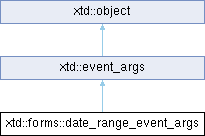|
| const xtd::date_time & | end () const noexcept |
| | Gets the last date/time value in the range that the user has selected.
|
| |
| const xtd::date_time & | start () const noexcept |
| | Gets the first date/time value in the range that the user has selected.
|
| |
|
| static const event_args | empty |
| | Provides a value to use with events that do not have event data.
|
| |
| | event_args ()=default |
| | Initializes a new instance of the event_args class.
|
| |
| | object ()=default |
| | Create a new instance of the ultimate base class object.
|
| |
| virtual bool | equals (const object &obj) const noexcept |
| | Determines whether the specified object is equal to the current object.
|
| |
| virtual xtd::size | get_hash_code () const noexcept |
| | Serves as a hash function for a particular type.
|
| |
| virtual type_object | get_type () const noexcept |
| | Gets the type of the current instance.
|
| |
| template<class object_t> |
| xtd::unique_ptr_object< object_t > | memberwise_clone () const |
| | Creates a shallow copy of the current object.
|
| |
| virtual xtd::string | to_string () const |
| | Returns a xtd::string that represents the current object.
|
| |
| template<class object_a_t, class object_b_t> |
| static bool | equals (const object_a_t &object_a, const object_b_t &object_b) noexcept |
| | Determines whether the specified object instances are considered equal.
|
| |
| template<class object_a_t, class object_b_t> |
| static bool | reference_equals (const object_a_t &object_a, const object_b_t &object_b) noexcept |
| | Determines whether the specified object instances are the same instance.
|
| |
◆ date_range_event_args()
◆ end()
| const xtd::date_time & xtd::forms::date_range_event_args::end |
( |
| ) |
const |
|
inlinenoexcept |
Gets the last date/time value in the range that the user has selected.
- Returns
- A xtd::date_time that represents the last date in the date range that the user has selected.
◆ start()
| const xtd::date_time & xtd::forms::date_range_event_args::start |
( |
| ) |
const |
|
inlinenoexcept |
Gets the first date/time value in the range that the user has selected.
- Returns
- A xtd::date_time that represents the first date in the date range that the user has selected.
The documentation for this class was generated from the following file:

